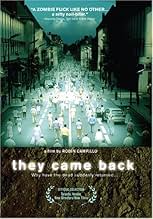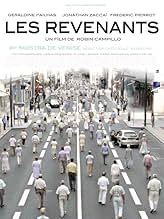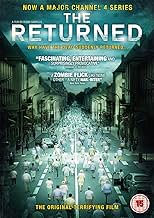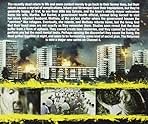AVALIAÇÃO DA IMDb
5,8/10
3 mil
SUA AVALIAÇÃO
Adicionar um enredo no seu idiomaThe lives of the residents of a small French town are changed when thousands of the recently dead inexplicably come back to life and try to integrate themselves into society that has changed... Ler tudoThe lives of the residents of a small French town are changed when thousands of the recently dead inexplicably come back to life and try to integrate themselves into society that has changed for them.The lives of the residents of a small French town are changed when thousands of the recently dead inexplicably come back to life and try to integrate themselves into society that has changed for them.
- Direção
- Roteiristas
- Artistas
- Prêmios
- 2 vitórias e 5 indicações no total
- Direção
- Roteiristas
- Elenco e equipe completos
- Produção, bilheteria e muito mais no IMDbPro
Avaliações em destaque
I liked this movie. It had a dreamy, parable-like quality to it that reminded me of films like Man Facing Southeast (1986) and The Rapture (1991). The focus is not really on the plot, so if you are annoyed with movies that don't explain a lot of the action, this is probably not the movie for you. Some would probably find it a little pretentious too; personally, it was well within my own threshold.
The cinematography is really good throughout, and the acting is well-done. The director is very successful in evoking a strange, off-kilter feeling, which predominates and occasionally escalates into eeriness and even a little dread. The newly returned dead are enigmas to their living relations and the audience both.
I felt somewhat let down by the ending, but not as much as I would have thought if I'd known the plot of the movie beforehand. Although some things in the movie (mostly plot elements) were not resolved to my satisfaction, I did feel like the character development was complete by the end. That focus is fairly typical of the movie as a whole.
The cinematography is really good throughout, and the acting is well-done. The director is very successful in evoking a strange, off-kilter feeling, which predominates and occasionally escalates into eeriness and even a little dread. The newly returned dead are enigmas to their living relations and the audience both.
I felt somewhat let down by the ending, but not as much as I would have thought if I'd known the plot of the movie beforehand. Although some things in the movie (mostly plot elements) were not resolved to my satisfaction, I did feel like the character development was complete by the end. That focus is fairly typical of the movie as a whole.
This film stirs a few emotional quandaries, many of which a viewer may choose not to explore. If the purpose of film is to generate thought and reflection as much as to entertain, 'Les Revenants' succeeds by virtue of it's creepy essence and the personal and social problems we'd encounter as individuals if faced with the reality of having our dead loved ones come back to us. The subject is handled cleverly and touchingly by the director who never attempts to drive our view but allows the characters to help us define our feelings. Particularly perplexing for a parent who might give just about anything to see their fallen child again. The misty night scenes, serene almost drugged manner with which the dead carry themselves and the evolution of divided feelings regarding their return by the living give the film an ethereal pace which may disappoint flesh hungry zombie fans.
I was stunned by this one - from the opening sequence on I was completed transfixed. The slow and melancholy pacing, the morose blue filters, the long silences and the fixed stares, all combined to create a spacious and powerfully - almost painfully - introspective viewing experience.
This is a remarkable meditation on the Zombie sub-genre as well, although clearly partaking of something quite well beyond that more limited scope. No corpse-eating ghouls here: just a fascinating "what if" that raises painful questions about what we do with death and the dead in our own collective imagination. In this particular return of the repressed, being forced to mull over the tedious, bureaucratic details of what would have to happen if hundreds of millions of dead people suddenly reappeared in our midst actually serves to engage the viewer in a very personal way. I found myself interrogating myself over and over about what kind of response I would have in a similar situation, and identifying with the film's protagonists on all sorts levels, and the experience was quite moving.
All the nuances of grief and mourning were shockingly subtle and well-conceived, as well as superbly acted.
The whole time I was watching I kept thinking: "Thank god for the French!" Such a movie could simply never arise from Hollywood.
This is a remarkable meditation on the Zombie sub-genre as well, although clearly partaking of something quite well beyond that more limited scope. No corpse-eating ghouls here: just a fascinating "what if" that raises painful questions about what we do with death and the dead in our own collective imagination. In this particular return of the repressed, being forced to mull over the tedious, bureaucratic details of what would have to happen if hundreds of millions of dead people suddenly reappeared in our midst actually serves to engage the viewer in a very personal way. I found myself interrogating myself over and over about what kind of response I would have in a similar situation, and identifying with the film's protagonists on all sorts levels, and the experience was quite moving.
All the nuances of grief and mourning were shockingly subtle and well-conceived, as well as superbly acted.
The whole time I was watching I kept thinking: "Thank god for the French!" Such a movie could simply never arise from Hollywood.
I'll admit, Campillo's "Les Revenants" is several artistic steps below (and two hours shorter than) any Tarkovsky epic. But as I watched the film, I couldn't get Tarkovsky's original "Solaris" out of my mind. The two films share a kind of somnambulist's sadness, a lumbering quality of going nowhere slowly, a dreaminess that falls somewhere between irritating nightmare and ho-hum sexdream. Oh, and both movies are populated with previously dead people, of course.
"Solaris" and "Les Revenants" pose similar questions as well: Are we dealing with actual "returnees," or are we simply struggling with the very palpable memories of those who have passed on? (Think about how "empty" the zombies are in both films and how they just sort of fade away--physically or spiritually--in both films.) Are these returnees dangerous to us? Or are we simply harming ourselves? More poignant, are WE the actual zombies? Hmmmm, hard to say. The film doesn't offer up any easy answers either as we see the crypt-dwellers attempting to return to their lives in the little French village as if things were...just fine.
And regarding the lack of answers, we also never find out what it was like to actually be dead either. If anything annoyed me about Campillo's "avant zombie flick," it's that. I kept waiting, wondering, would someone finally ask their deceased relative or returnee-loved-one lounging in bed next to them: "So, what's the afterlife like exactly? I mean, did that coffin get cramped? Did lying in the ground for ten years get irritating? Did you ever get the urge to roll over but didn't have enough room to maneuver? Would you choose cremation next time around, or would you just take a battery-powered TV with you into your grave next time?" But none of those topics ever came up. Of course, such a conversation really wouldn't have fit the arty tenor of the movie anyway.
But COME ON! ADMIT IT! These are precisely the weighty issues we want to hear about from experienced dead folks, right? I mean if you are having a picnic with a zombie (and YOU aren't the picnic, that is) you're gonna ask. You know you would.
I realize it is unlikely this movie would exist if it weren't for the wonderful Romero and his ilk. But overall, I offer a hearty kudos to Campillo for breathing life into the long-dead zombie subgenre. There are SO MANY zombie films out there (they seem to appear weekly), and I admit that I grew up digesting many of those Italian, German, and English delights. But with age and experience, you eventually tire of fast food, and you realize that the next "Zombie Intestine Massacre" flick is simply and mindlessly repeating itself so that every SPFX guy on the studio lot can keep his or her job. That's fine. But kiddies looking for gut-munching scenes will find none here--let them go elsewhere and leave the adults in peace.
"Solaris" and "Les Revenants" pose similar questions as well: Are we dealing with actual "returnees," or are we simply struggling with the very palpable memories of those who have passed on? (Think about how "empty" the zombies are in both films and how they just sort of fade away--physically or spiritually--in both films.) Are these returnees dangerous to us? Or are we simply harming ourselves? More poignant, are WE the actual zombies? Hmmmm, hard to say. The film doesn't offer up any easy answers either as we see the crypt-dwellers attempting to return to their lives in the little French village as if things were...just fine.
And regarding the lack of answers, we also never find out what it was like to actually be dead either. If anything annoyed me about Campillo's "avant zombie flick," it's that. I kept waiting, wondering, would someone finally ask their deceased relative or returnee-loved-one lounging in bed next to them: "So, what's the afterlife like exactly? I mean, did that coffin get cramped? Did lying in the ground for ten years get irritating? Did you ever get the urge to roll over but didn't have enough room to maneuver? Would you choose cremation next time around, or would you just take a battery-powered TV with you into your grave next time?" But none of those topics ever came up. Of course, such a conversation really wouldn't have fit the arty tenor of the movie anyway.
But COME ON! ADMIT IT! These are precisely the weighty issues we want to hear about from experienced dead folks, right? I mean if you are having a picnic with a zombie (and YOU aren't the picnic, that is) you're gonna ask. You know you would.
I realize it is unlikely this movie would exist if it weren't for the wonderful Romero and his ilk. But overall, I offer a hearty kudos to Campillo for breathing life into the long-dead zombie subgenre. There are SO MANY zombie films out there (they seem to appear weekly), and I admit that I grew up digesting many of those Italian, German, and English delights. But with age and experience, you eventually tire of fast food, and you realize that the next "Zombie Intestine Massacre" flick is simply and mindlessly repeating itself so that every SPFX guy on the studio lot can keep his or her job. That's fine. But kiddies looking for gut-munching scenes will find none here--let them go elsewhere and leave the adults in peace.
Well, anyone who's been to a 'zombie' movie knows that nothing good can come from bringing the dead back to life, but director Robin Campillo presents a more interesting dilemma. How would a society accommodate and re-integrate their loved ones and relatives if they suddenly came walking out of the cemetery with clean clothes, no illnesses, and energy to spare.
What director Campillo has done is replaced 'scary' with 'eerie' as a local government struggles to shelter and re-located hundreds of the town's former inhabitants. In addition, the town's mayor must decide whether people can return to their old jobs, their old lives, or whether they should be studied to determine how all this came about.
Film takes a very matter-of-fact approach to sifting through a population influx, much like having a large group of refugees arrive in your town. The local scientists do make some early discoveries involving reduced sleep patterns, lower body, temperature, and how these 'arrivals' may only be acting normal as memory response.
If you enjoyed last year's "Time Out" (which Campillo co-wrote), then you'll also appreciate this spooky, but 'non-flesh eating', dead people coming back to life cinema experience. In some ways having your ex-wife come back can be scarier than a zombie, eh guys?
What director Campillo has done is replaced 'scary' with 'eerie' as a local government struggles to shelter and re-located hundreds of the town's former inhabitants. In addition, the town's mayor must decide whether people can return to their old jobs, their old lives, or whether they should be studied to determine how all this came about.
Film takes a very matter-of-fact approach to sifting through a population influx, much like having a large group of refugees arrive in your town. The local scientists do make some early discoveries involving reduced sleep patterns, lower body, temperature, and how these 'arrivals' may only be acting normal as memory response.
If you enjoyed last year's "Time Out" (which Campillo co-wrote), then you'll also appreciate this spooky, but 'non-flesh eating', dead people coming back to life cinema experience. In some ways having your ex-wife come back can be scarier than a zombie, eh guys?
Você sabia?
- CuriosidadesFrédéric Pierrot, who plays Gardet, also appears in the 2012 TV series Les Revenants (2012) as the character Jerome.
- ConexõesRemade as Les Revenants (2012)
Principais escolhas
Faça login para avaliar e ver a lista de recomendações personalizadas
- How long is They Came Back?Fornecido pela Alexa
Detalhes
Contribua para esta página
Sugerir uma alteração ou adicionar conteúdo ausente
























